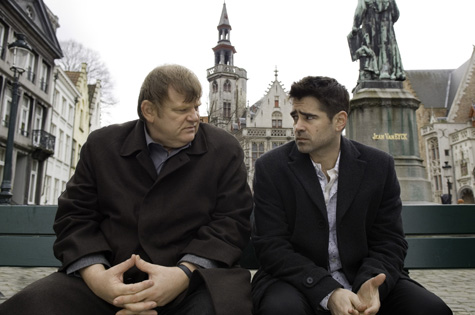
An ancient port town in the northwest corner of Belgium, Bruges, we are told early on in the film, is the “best-preserved medieval (pronounced “meddy-evil” by our Hibernian heroes) city in Europe.” It’s also the hideout for two Irish hitmen laying low(-country) after a botched job back in London. Ken (Gleeson), the older and more experienced of the duo, is enthused about the chance to sightsee, even if he senses grim portent in the fact they’re hiding out so far away. On the other hand, his partner Ray (Colin Farrell, a good actor but miscast — the part needs someone younger and dumber. Ewan Bremner, maybe?) is aghast by the place, and completely bored senseless from the moment they arrive…until he makes the company of a beautiful local drug dealer, Chloe (Clemence Poesy, best known as Fleur Delacour. Yep, it’s Fleur and Mad-Eye and…well, you’ll see.)
But even Chloe’s considerable charms — and a few drug-fueled binges with a visiting dwarf actor and his coterie of hookers — can’t take Ray’s mind off recent events. You see, the last job (offing Ciaran Hinds) took a dismal turn, innocent blood was spilled, and now Ray feels trapped in the endless purgatory of unabsolved sin. (Having recently sat through Cassandra’s Dream, where he had exactly the same problem, my advice is get over it already. This is another reason why Farrell seems miscast. He’s played too many memorably world-weary strongmen — The New World, Miami Vice, even Daredevil — to seem the aggrieved innocent here.) At any rate, Ray’s mortal screw-up doesn’t sit well with the boss of Ray and Ken’s outfit either — that would be Harry (Ralph Fiennes, playing an amalgamation of Lord Voldemort and Ben Kingsley’s character in Sexy Beast.) And eventually Harry decides to come to Bruges himself to make a reckoning. Let’s just say he’s not coming for the chocolates…
Fiennes’ wildly over-the-top Cockney crime lord is one of the funnier treats in In Bruges, and it’s almost worth the ticket just to watch him delight in being so gleefully unrestrained. (Other than He-Who-Must-Not-Be-Named, of course, and occasional roles like Spider and Red Dragon, Fiennes has — since his breakthrough in Schindler’s List — mostly got stuck in clipped-and-distant, dignified understatement mode, a la The Constant Gardener or Maid in Manhattan.) Matching him toe-to-toe is Gleeson as the voice of conscience In Bruges — I still have yet to see him give a bad performance, and even though his final scenes are rather goofy and implausible here, Gleeson sells it. He’s the heart and soul of the film.
But, even with the quality of acting on display here, there’s a quite a bit of filler in-between the better moments. McDonagh’s jokes are, frankly, hit-or-miss. Even notwithstanding some of the more obvious targets (Americans are fat and self-centered, Belgium is a “sh**hole”), McDonagh’s ear is curiously tone-deaf at times, and his attempts to be edgy and profane by pushing the un-PC envelope often sound dated and embarrassing (Note, for example, the aforementioned racist midget’s screed, Farrell’s strange seesaw analogy, or Fiennes’ AK-47 rant about South Central drive-bys. Ten points from Slytherin.) I wasn’t inherently offended by the attempts, really, but if you’re going to head down that road, at least be funny or clever. Too often, McDonagh seems to expect the shock level to do all the heavy lifting. (Another case in point, the restaurant beatdown.)
In any case, In Bruges has its moments, but I can’t advocate dropping everything to rush out to see it. If you’re the type of person who enjoys decently-made Tarantino-knockoffs, or actors playing against type a la Sexy Beast, add it to the Netflix queue. Otherwise, I’d hold off. I’m sure somebody will make another film about lovely, historic Bruges, a few more centuries hence.
